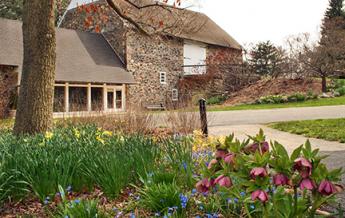Related Topics
Right Angle Club 2017
Dick Palmer and Bill Dorsey died this year. We will miss them.
Azaleas and Rhodedendrons at Tyler Arboretum

|
| Tyler Arboretum |
Philadelphia has more arboretums than anywhere else, probably dating from the days when Quakers frowned on aesthetic entertainments, but held lots and lots of land. Curiously, azaleas are a Quaker thing (remember Swarthmore College and Friends Hospital), while anti-azalea feelings are growing among non-Quakers. It all has to do with bugs.

|
| Azaleas flourish in Korea |
Azaleas flourish in Korea, where the hills are covered with pink bushes in the spring, and Quaker merchant ships brought them home to sell as curiosities. Both Korea and Philadelphia are on the 40th parallel, so azaleas flourish in both places. But Japan and Korea escaped the glaciers, so their plant life was sort of isolated and unique until intercontinental merchants came along. The rest of the world, therefore, contained few natural predators, and they grew unhindered, here. Generally speaking, azaleas are an East Coast phenomenon; it is not uncommon for midwestern visitors to exclaim they never saw them before, although it is true rhododendrons love acid soil, and rather suffer from the alkaline midwestern soil left over from the seashells of the ancient central sea bottom.

|
| Rhododendron |
On the other hand, there is a growing anti-azalea craze among avid gardeners, taking the form of pro-nativist feelings much like R vs. D. The recent hatred of imported flowers reflect a reaction to "invasive" weeds brought here by importing other globalized products and dumping them along the banks and shorelines. The common denominator is lack of native weed enemies to both the globalized weeds, and azaleas, which caused a withering of the bugs which eat the plants, and in turn, are eaten by birds. So this discovery by the University of Delaware took root in Mount Cuba, the DuPont estate which is exclusively and consciously planted with nativist plants, and promoted by socially prominent families who like birds more than show-gardens -- and enjoy tax benefits from botany favored land preservation.

|
| Philadelphia Arboreta |
This results in an alarming pressure to encourage Philadelphia's many arboreta to play down the showy azaleas they formerly favored, making enemies out of friends. It seemingly pits those who love birds against those barbarians who love gardens. It seems unnecessary for the bird lovers to attack the innocent gardeners when the focus might be turned against the bugs, where many fewer would take offense. Just think of the possibilities of Girl Scouts taking up the cause of bug hybridization, running around the countryside with glass jars to capture likely natural predators to the bugs which plant- predators favor to promote the right kind of birds. That way, we might have our birds -- and preserve our azaleas too. Meanwhile breeding the right sort of bug no one would notice, or inhibiting the wrong sort of bug if that proves the easier path to follow. Maybe Dow Chemicals could make a fortune with a selective bug-killer spray, and keep the former DuPont company from entering this dispute between seemingly natural friends.
Originally published: Sunday, June 25, 2017; most-recently modified: Tuesday, May 14, 2019